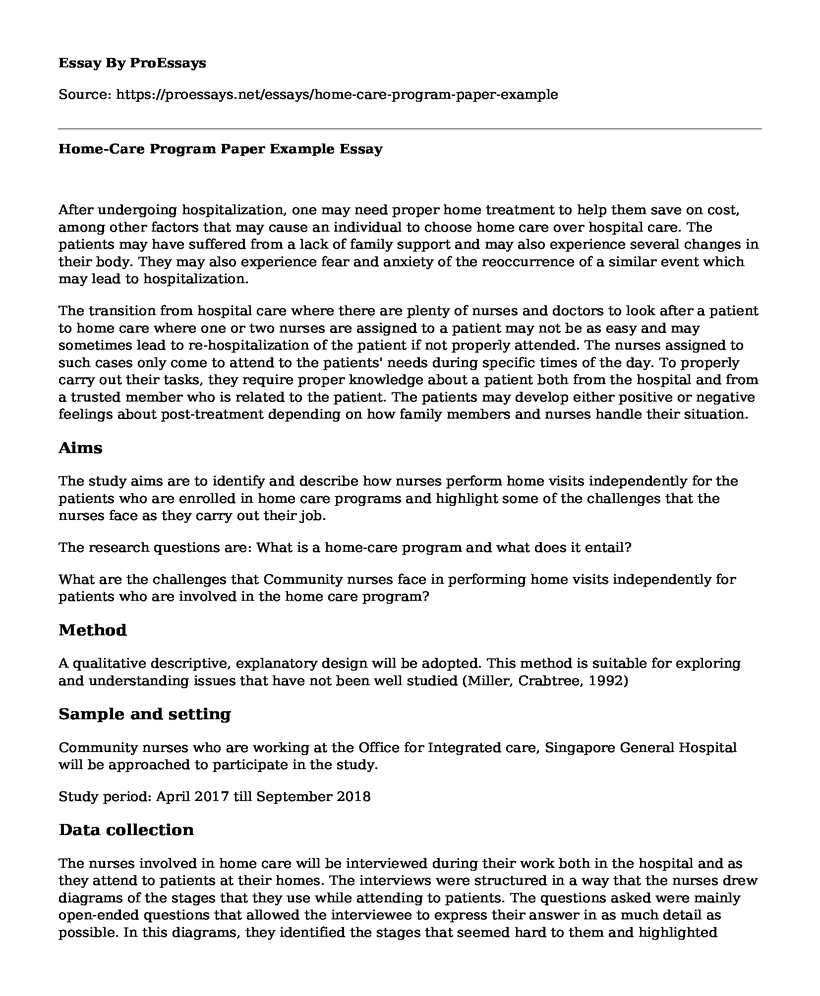After undergoing hospitalization, one may need proper home treatment to help them save on cost, among other factors that may cause an individual to choose home care over hospital care. The patients may have suffered from a lack of family support and may also experience several changes in their body. They may also experience fear and anxiety of the reoccurrence of a similar event which may lead to hospitalization.
The transition from hospital care where there are plenty of nurses and doctors to look after a patient to home care where one or two nurses are assigned to a patient may not be as easy and may sometimes lead to re-hospitalization of the patient if not properly attended. The nurses assigned to such cases only come to attend to the patients' needs during specific times of the day. To properly carry out their tasks, they require proper knowledge about a patient both from the hospital and from a trusted member who is related to the patient. The patients may develop either positive or negative feelings about post-treatment depending on how family members and nurses handle their situation.
Aims
The study aims are to identify and describe how nurses perform home visits independently for the patients who are enrolled in home care programs and highlight some of the challenges that the nurses face as they carry out their job.
The research questions are: What is a home-care program and what does it entail?
What are the challenges that Community nurses face in performing home visits independently for patients who are involved in the home care program?
Method
A qualitative descriptive, explanatory design will be adopted. This method is suitable for exploring and understanding issues that have not been well studied (Miller, Crabtree, 1992)
Sample and setting
Community nurses who are working at the Office for Integrated care, Singapore General Hospital will be approached to participate in the study.
Study period: April 2017 till September 2018
Data collection
The nurses involved in home care will be interviewed during their work both in the hospital and as they attend to patients at their homes. The interviews were structured in a way that the nurses drew diagrams of the stages that they use while attending to patients. The questions asked were mainly open-ended questions that allowed the interviewee to express their answer in as much detail as possible. In this diagrams, they identified the stages that seemed hard to them and highlighted them. They were then asked to identify the steps that required intuitive knowledge and cognition. The nurses explained situations in which they were offered with misleading information if any and the effects the mistake had both on them and the patient.
Data analysis
The interviews were recorded in tapes for study and they later studied the tapes and came up with explanations about how home care nursing is done and the problems that nurses face in their job. The notes that were taken down were then read out, and the team discussed and came up with a result after comparing the different views that the different interviewers had. Ethical considerations
Approval from the central Institutional Review Board will be sought prior to the commencement of the study. All community nurses are required to give their written consent to participate in the survey and have their conversations audio-recorded. They were informed that their participation is voluntary and they can withdraw from the study at any time without explanation. The participants will be provided with the participant information sheet about the details of the study.
References
Population.sg (2018). Population in Brief: What do you need to know? Retrieved from
https://www.population.sg/articles/population-in-brief-what-do-you-need-to-know [Accessed 17 Sep. 2018].
Cite this page
Home-Care Program Paper Example. (2022, Aug 17). Retrieved from https://proessays.net/essays/home-care-program-paper-example
If you are the original author of this essay and no longer wish to have it published on the ProEssays website, please click below to request its removal:
- Nursing Ethics Theories Paper Example
- Health System & Ethical Guidelines: Making Informed Choices - Essay Sample
- Essay Sample on Breast Cancer: Early Detection and Awareness for Women's Health
- A Life Worth Ending: Essay Sample on Autonomy and Mortality
- Essay Sample on Nurse Practitioner Semester Goals: Learnings, Clinicals & Ethical Dilemmas
- B Corporations: A Guide to Achieving Greater Social Impact - Essay Sample
- Paper Example on Food Deserts: Causes of Nutritional Inequality







